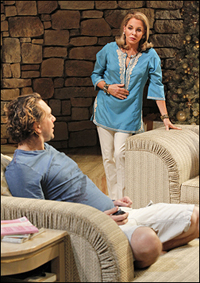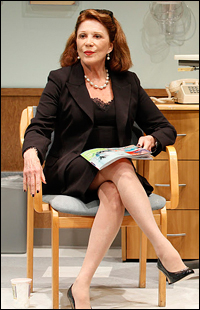
*
Every once in a while a play comes along with a genuine mother of a maternal role: from Medea through The Glass Menagerie to 'night, Mother and Three Tall Women to more recent productions like Doubt, Well and August: Osage County. But this past season in New York City gave theatregoers (Off-Broadway and on) more memorable moms than most — in Other Desert Cities, The Lyons, Tribes, Russian Transport and Hurt Village — even if few of them could be considered role models to hold up as your family's matriarch on Mother's Day.
"You just can't get away from Mom," says Mare Winningham, whose character in Tribes, Beth, is the most likeable mother of the bunch. She says that mothers make a natural subject: "Mothers make these big, massive decisions as parents and then have to trust doing the right things and then have to live with them."
There's no real rhyme or reason as to why mothers are suddenly hot — the creators are men and women, black and white, American and British, newcomers and veterans. None are biological mothers, though all have had one. "Maybe a lot of playwrights went to therapy at the same time," quips Erika Sheffer, whose Off-Broadway play Russian Transport featured a hardened immigrant mother named Diana, who pushes her children and is even willing to betray them. More seriously, Sheffer wonders if playwrights are simply striving to write more complex parts for women in their 30s or older.
For Nicky Silver, The Lyons came about because his last play felt overly intellectual, so he "wanted to write the simplest play I could — take a family and let them talk. The character of Rita very quickly took center stage."
 |
||
| Thomas Sadoski and Stockard Channing in Other Desert Cities. |
||
| photo by Joan Marcus |
These women, especially Rita and Polly, of Jon Robin Baitz's Other Desert Cities (played by Stockard Channing), have kept much of their inner lives secret even as they've cut their children with their brilliant yet barbed tongues.
But both Lavin and Channing point out that the children don't really know their parents well. In fact, Channing points out, "the misperceptions of our own parents is a major part of the play."
Lavin, who played Polly's sister in the Off- Broadway production of Other Desert Cities before moving on to The Lyons, says both plays are about "missed connections and poor communication."
Both women also think back to their own mothers often; Lavin has a picture of her mother — "a little woman with great positive energy" — in her dressing room.
Both Polly and Rita seem almost cruel at the start, but audiences' opinions of them shift as their true stories are revealed. "Nobody knows what Polly has done for her family until the last minutes of the play," Channing points out. "Her daughter writes a book about her mother because she thinks she knows her, but she really doesn't. The play shows the audience how we make these assumptions."
Baitz says that Polly may not be nurturing, but she's "driven by a profound sense of desire for security for her family. She's a very strong woman."
 |
||
| Linda Lavin in The Lyons. |
||
| Photo by Carol Rosegg |
Lavin sees why Rita is finally pushing her adult children to stand on their own, adding "after the show one night a mother and daughter told me they laughed and cried with identification."
While Sheffer sought to balance Diana's Personality — strong Russian women "can seem unlikable from the outside even when they are loving, and I wanted audiences to see a more complex representation" — both Baitz and Silver say they make no effort to soften their characters for the audience. "That never concerns me," Silver admits, though he says Lavin makes Rita "funnier than she was on the page," which humanizes her more.
These characters are not autobiographical — Silver consciously distanced Rita from his own mother — but they are certainly realistic: Hall says that watching Other Desert Cities, she would "shrivel up at a word or glance from Stockard's Polly. She reminds me of my mom in that she takes no crap."
The mom in Tribes stands apart; her "selfless voice" was necessary in the noisy, argumentative family created by playwright Nina Raine. "It wasn't exactly conscious on my part," she says, "but from the very first scene a different 'instrument' was demanded in the melody of the family's orchestra." But Raine consciously sought to make Beth intelligent enough and strong enough that she isn't "simply a stooge wringing her hands at the edges of the battlefield." While Raine wrote in Beth's "brutal honesty," she says that Winningham gives the character a toughness missing from the London production, where Beth was more easily wounded and perhaps too desperate.
"She's what you dream of in a mom because she's strong of love and strong of compassion, but that makes her indulge her children and let them get away with too much," Raine says. "She has too much empathy so she sometimes can't really see her kids. That's her blind spot."











